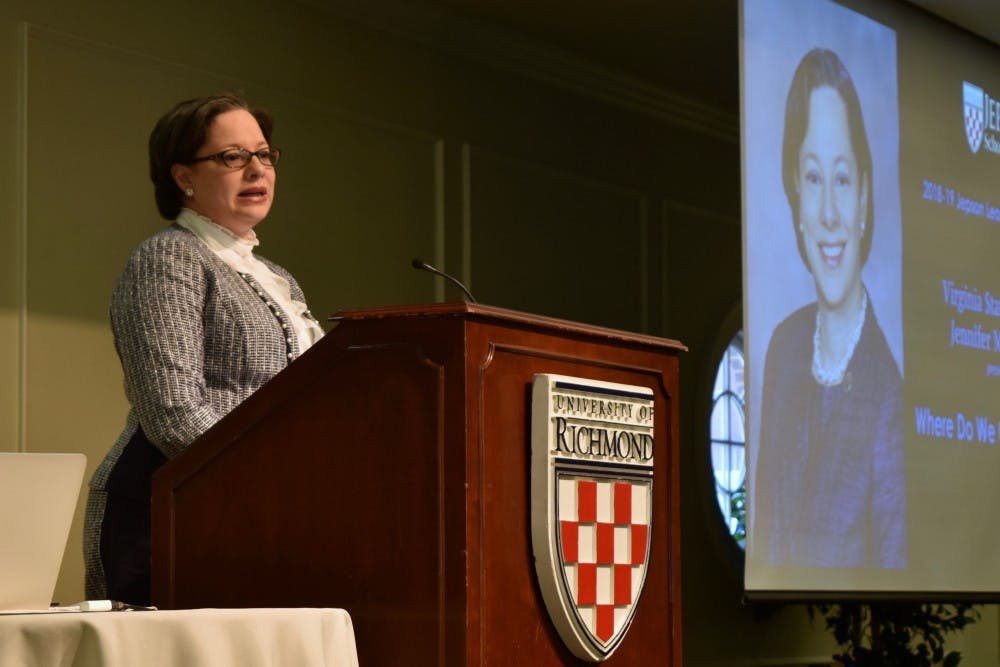Leaders must understand the effects of past oppression on the present in order to move forward.
Virginia State Senator Jennifer McClellan, as the 2018-19 Jepson Leader-in-Residence, gave a lecture titled, “Where Do We Go From Here,” on March 27, at the Jepson Alumni Center.
“To forge ahead, you first have to fully understand where you are," McClellan said. "And to understand where you are, you have to understand where you come from, where you’ve been, how you got there and how it has shaped your present and your path forward.”
McClellan addressed the issue of today's leaders incorrectly laying the framework of the future because they do not know of or are forgetting society’s past.
“Throughout my career in state government before 2019, I have seen and come to understand how decisions made in the past, actions taken in the past, points of view had in the past have shaped problems we still face today,” McClellan said.
McClellan gave a brief history of how the “foundations of our commonwealth and country were established on power structures put in place in 1619 that put land-owning white men at the top, to be served by women, and both of whom were served by Africans.”
Inherent and explicit prejudices and hatred against other races, religions, genders and sexual orientations throughout the country’s history have held people back by perpetuating age-old systemic oppression, McClellan said.
“In 2019, we still live in a commonwealth where a child with autism can be charged with a misdemeanor and suspended from school because, when called to the principal’s office, he kicks a trash can over,” McClellan said.
Virginia is still a commonwealth in which people of color and people with disabilities, particularly mental health issues, are disproportionately represented as criminal defendants, recipients of social services or children in foster care, she said.
"But they are underrepresented as judges, lawyers, caseworkers, teachers, principals or any of the leaders of institutions that can help break these cycles," McClellan said.
Education, when modified to incorporate learning about all communities, will help combat this systemic ignorance and oppression.
“[People] are beginning to see that ignorance is just as big a problem as overt hatred,” McClellan said, adding, “It is not something that can be done just by our education system. It needs to be done by us.”
Enjoy what you're reading?
Signup for our newsletter
A way to combat ignorance is to have hard conversations about potentially upsetting topics. Junior Lina Tori Jan asked the senator a question about how to have and navigate these hard conversations.
“Get in a room and talk to someone completely different, whether it’s Democrats or Republicans, black or white, men and women," McClellan said, "and talk about why you believe what you believe, why you see problems the way you see them and what we can do about it."
After the lecture, Tori Jan reflected on having hard conversations.
“The most important part is that we don’t want to have these conversations,” Tori Jan said. “We don’t want to step on each other's toes. We must be patient and listen. We all want to move forward.”
Senior Alicia Jiggetts felt encouraged after hearing McClellan's lecture.
“I have a renewed energy for social justice and change,” Jiggetts said.
Contact contributor Holly Schiltz at holly.schiltz@richmond.edu.
Support independent student media
You can make a tax-deductible donation by clicking the button below, which takes you to our secure PayPal account. The page is set up to receive contributions in whatever amount you designate. We look forward to using the money we raise to further our mission of providing honest and accurate information to students, faculty, staff, alumni and others in the general public.
Donate Now



